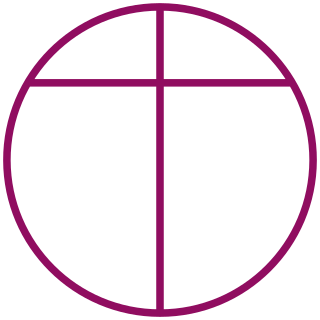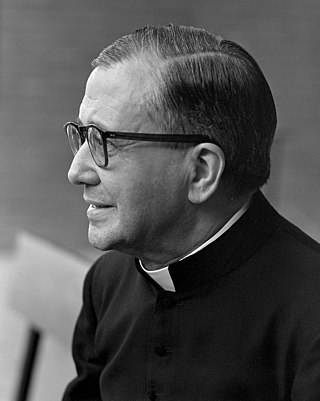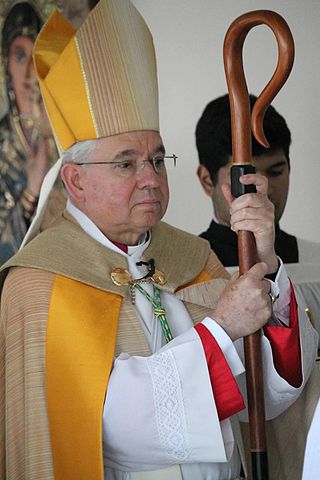
Chloe Anthony Wofford Morrison, known as Toni Morrison, was an American novelist and editor. Her first novel, The Bluest Eye, was published in 1970. The critically acclaimed Song of Solomon (1977) brought her national attention and won the National Book Critics Circle Award. In 1988, Morrison won the Pulitzer Prize for Beloved (1987); she was awarded the Nobel Prize in Literature in 1993.

Opus Dei is an institution of the Catholic Church that was founded in Spain in 1928 by Catholic priest Josemaría Escrivá. Its stated mission is to help its lay and clerical members to seek Christian perfection in their everyday occupations and within their societies. Opus Dei has long attracted significant controversy regarding its political activities and its alleged cult-like practices.

Saint Josemaría Escrivá de Balaguer y Albás was a Spanish Catholic priest who founded Opus Dei, an organization of laypeople and priests dedicated to the principle of everyday holiness. He was canonized in 2002 by Pope John Paul II, who declared Josemaría should be "counted among the great witnesses of Christianity."
Chile's abortion laws have undergone significant changes in recent years. Prior to 2017, Chile had one of the strictest abortion laws globally, prohibiting the practice altogether. However, since then, abortion has become legal in certain circumstances.

José Horacio Gómez Velasco is a Mexican-born American prelate of the Catholic Church. He became the fifth archbishop of the Archdiocese of Los Angeles in California in 2011. He previously served as an auxiliary bishop of the Archdiocese of Denver in Colorado from 2001 to 2004 and as archbishop of the Archdiocese of San Antonio in Texas from 2004 to 2010.
Opus Dei: A Historical Timeline shows the historical development of Opus Dei.
Opus Dei and Catholic Church Leaders discusses the comments and observations of popes, cardinals, and other leaders of the Catholic Church as regards the Personal Prelature of the Holy Cross and Opus Dei.

Teachings of Opus Dei are the teachings of the founder of Opus Dei, St. Josemaría Escrivá de Balaguer.
Opus Dei in society refers to the social mission, general social strategy, social activities, work, relationship with politics and other aspects of Opus Dei.

The Priestly Society of the Holy Cross is an association of Catholic diocesan priests which is integrally united to the Prelature of Opus Dei.
Opus Dei is a personal prelature within the Roman Church that has been the subject of numerous controversies. Throughout its history, Opus Dei has been criticized by many, including by numerary members who knew the founder and had roles in Opus Dei's internal government. The reports by former members in the US, England, Spain, Latin America, France, Germany, and other countries are published. Journalists have described it as "the most controversial force in the Catholic Church" and its founder Josemaría Escrivá as a "polarizing" figure.
The Da Vinci Code, a popular suspense novel by Dan Brown, generated criticism and controversy after its publication in 2003. Many of the complaints centered on the book's speculations and misrepresentations of core aspects of Christianity and the history of the Catholic Church. Additional criticisms were directed toward the book's inaccurate descriptions of European art, history, architecture, and geography.
Canonization of Josemaría Escrivá de Balaguer discusses John Paul II's decision to canonize Josemaría Escrivá, founder of the Prelature of the Holy Cross and Opus Dei, more commonly known as Opus Dei.

Pontifical University of the Holy Cross is a Roman Catholic university under the Curial Congregation for Catholic Education, now entrusted to the Prelature of the Holy Cross and Opus Dei, or more commonly called Opus Dei. It was started in 1984 by Opus Dei, with the aim of offering the universal church an effective instrument for formation and research.
Lexington College was a Catholic women's college located in Chicago, Illinois. The curriculum was focused entirely on hospitality management studies.

Fernando Ocáriz Braña is a priest of the Catholic Church who has been the prelate of Opus Dei since 2017. Ocáriz is the fourth person to head Opus Dei since its founding in 1928. He is widely published in philosophy and has been a consultor of the Congregation for the Doctrine of the Faith since 1986.
Women form 57% of the membership of the Opus Dei prelature. The role of women in Opus Dei has sometimes been a source of criticism for the organization.
Die Tagespost is a Catholic national weekly published by Johann Wilhelm Naumann Verlag in Würzburg, Germany. It bears the subtitle Katholische Wochenzeitung for politics, society and culture. Until 1 April 1999, it was called Deutsche Tagespost. The paper appeared three times a week, the Saturday edition with slight changes and an addition to the weekly Allgemeine Sonntagszeitung. Since January 2018, Die Tagespost has been published exclusively as a 32-page weekly newspaper and a paid online edition. According to journalists, it is a "right-wing Catholic" newspaper.








